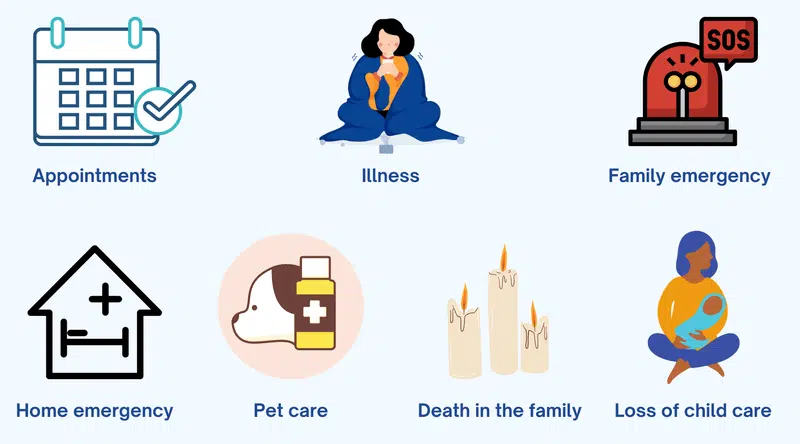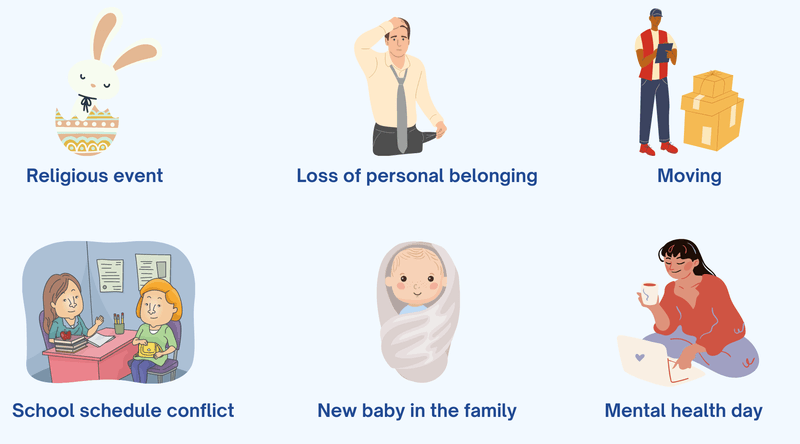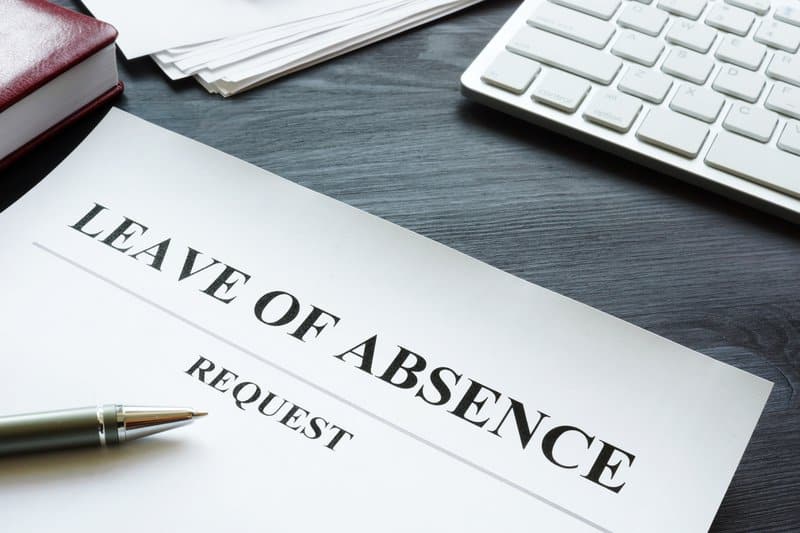What are the best excuses to get out of work? We all know work is an inseparable part of our lives, but work needs to balance our personal life. This means that we all have to take time off work at one point or another. There are quite a few occasions that, over the course of your career, that may lead to you missing work. Most firms have policies regarding leaves in place.
Also, they are highly particular that team members have their time off pre-approved by their managers. However, despite the best efforts of everyone involved, there will be times when employees take leaves without prior notice.
This piece will examine excuses to get out of work and address such issues. There are also reasons and excuses to leave work early, described in another article and usually accepted by employers.
It’s important to mention that you must always comply with company policies and never lie about why you need a day off. Having said that, let’s go!
The reasons or excuses to get out of work are separated into five sections:
- Best Health Excuses to Get Out of Work
- Best Excuses to Get Out of Work When You’re Pregnant
- Excuses to Get Out of Work Due To Family Matters
- Excuses to Get Out Of Work When You Work Remotely
- Other Common Excuses For Missing Work
To give you a summary right away, here are all the best excuses to get out of work:
- Dental Appointment
- Medical Appointment
- Illness
- Health Day
- Dentist Emergency
- Allergies
- Last-Minute Open Medical Appointment
- Need To Buy Urgent Medication
- Recover From A Medical Procedure
- Muscle Problems
- Pregnant Sickness
- Ultrasound Appointment
- Urgent Doctor Appointment
- Family Emergency
- Death In The Family
- School/Childcare Canceled
- Babysitter Canceled
- New Baby In The Family
- Parents Are Sick
- School Schedule Conflict
- Missed Pet
- Need To Take Care Of A Pet
- Home Emergency
- Moving
- Flooding
- Fire
- Buying or Selling Your House
- Unexpected Issues on Home Remodeling
- Unexpected Urgent Maintenance
- Someone Broke Into Your Home
- Lost Internet Signal
- Computer Has been Hacked
- MS Office Is Not Working
- Computer Virus
- The Computer Is Not Turning On
- Power Outage
- Not Feeling Well
- Need To Take Care Of A Child
- Maintenance At Home
- You’re Moving Your Home Office
- Car Problems
- Bad Weather
- Need To Fix Your Phone
- Religious Event / Celebration
- Loss of Personal Belongings
- Car Accident
- Jury Duty
- Special Occasion
- Military Obligations
- You Were Robbed
- When Traveling For Work, Your Flight Was Canceled
Here are a few examples of excuses to avoid:

Best Health Excuses to Get Out of Work
In this section, let us look at some of the most common excuses to get out of work.

1) Dental Appointment
A dental appointment, general health check-up, or a doctor’s appointment for a specific illness is one of the most common reasons employees leave work.
Usually, managers show genuine concern and ask about a person’s health. But, certain managers can be distrustful and want proof of the appointment. You can always say that the appointment was fixed last minute.
2) Medical Appointment
Medical appointments are considered one of the most acceptable excuses to miss a workday. Whether for yourself or another family member, having a medical appointment that requires extra time away from work can create legitimate hardship and necessitate taking a leave of absence.
A medical appointment may include physical check-ups, doctor appointments, mental health visits, and specialist visits such as dentists, optometrists, and other specialized check-up needs.
When taking a leave for medical reasons, many employers will require proof in the form of documentation. This may include an email or written note from your care provider, confirmations from the said visit, or further steps taken if a determination has been reached during the visit, such as additional follow-up exams/retrials tests.
3) Illness
Several illnesses make the ideal excuse to get off work—starting this one off with a fever. We all know that a fever can be a symptom of many contagious diseases, and no employer would like to take a chance.
However, some other conditions are just as good. Moreover, they help you describe how you are feeling. Some of these are:
- Body ache
- Nausea
- Diarrhea
- Eye infections
- Chronic back pain
- Muscle pain/cramps
But, you informed your manager immediately that you could not work as you were unwell. Also, do let him know how you would take to recover. Do not try to power yourself through work on a sick day, as your productivity will take a hit. Not to mention, your illness would also get aggravated.
4) Health Day
This is a perfectly valid excuse. However, showing restraint while sharing this information with your colleagues is advisable. But if your co-workers ask, you can always tell that something came up. So go ahead and inform your manager.
5) Dentist Emergency
A dental emergency can be an unexpected event that forces you to take time off work. Toothaches, broken fillings, or lost crowns are some dental issues that can arise suddenly and require immediate attention. In such cases, seeing an emergency dentist is often the only option – especially if waiting until your regular dentist is available could lead to more serious complications.
While missing work due to a dental problem may seem like a valid excuse, it's important to remember that doing so can impact your productivity and reputation at work. However, taking care of your health should always come first, and no employer wants their employees to experience severe tooth pain or other medical concerns while on the job. Therefore, if you need urgent dental care during working hours, don't hesitate to ask for help – just communicate with your employer as soon as possible about any necessary absence from work.
6) Allergies
Allergies can be a real pain, not just for those who suffer from them regularly. For some, allergies only rear their ugly heads during certain times of the year or after exposure to certain substances. However, when they strike, they can leave you feeling miserable and unable to function at your best. From stuffy noses and itchy eyes to difficulty breathing, allergies can make it nearly impossible to focus on anything else.
Furthermore, allergies are something that many people have little control over – they simply happen due to genetics or environmental factors outside of our control. This means that calling off work due to allergies is understandable and necessary if we want to care for our health properly. While some may view allergy symptoms as an excuse or something trivial that should be pushed through, we all must recognize the impact these conditions can have on mental health and overall well-being.
7) Last-Minute Open Medical Appointment
Sometimes, last-minute medical appointments can be a blessing in disguise when getting out of work. Suppose you have been under the weather or experiencing other health concerns causing distress. In that case, it is understandable to want to prioritize your well-being and attend this unexpected appointment. It's important not to feel guilty for taking time off work for your health, as ultimately, taking care of yourself will help you become a better employee in the long term.
While we should never encourage individuals to lie about attending medical appointments just to get out of work, sometimes things happen unexpectedly, and you need a legitimate excuse. Be honest with your employer about why you need time off and provide any necessary documentation from the appointment.
Most employers will understand and value their employees' well-being over temporary coverage gaps at work. Remember that mental health is also an integral part of overall wellness- if you're struggling emotionally, don't hesitate to seek professional support or consider taking some personal days if needed. Your employer values your contributions and likely wants healthy and happy employees above all else.
8) Need To Buy Urgent Medication
It's also important to remember that some excuses for getting out of work are not frivolous – sometimes, you have urgent things to take care of. This can include buying medication that you desperately need. It might seem difficult or uncomfortable to explain this kind of situation to your employer, but it's important to prioritize your health and safety.
If you know your physical or mental well-being is at risk without taking a certain medication, don't hesitate to contact your workplace and let them know.
Many companies have policies in place specifically for situations like these. Your employer may be understanding and accommodating if they realize just how crucial it is for you to purchase the necessary medication as soon as possible.
Above all else, try not to feel guilty about needing time off work for something like this – taking care of yourself should always come first. So whether it's due to a sudden headache or something more serious, never be afraid to ask for time off when you really need it.
9) Recover From A Medical Procedure
Recovering from a medical procedure can be an incredibly challenging time. Whether it's due to minor surgery or something more invasive, your body needs plenty of rest and care to heal properly. This means taking time off work and changing your routine to prioritize recovery. While it may seem daunting at first, remember that this is a necessary step in getting back on your feet – both physically and mentally.
It's important during this time to listen to your body, follow doctor's orders, and make the most of your downtime. Keep yourself occupied with things that bring you joy – whether reading a good book or catching up on some TV shows – but also take advantage of the extra opportunity for self-care, such as practicing meditation or going for gentle walks outside if permitted by the surgeon's instructions.
Remember, recovering from a medical procedure is not just about physical health but also mental well-being. Don't hesitate to reach out for support when needed- whether from friends, family, or professional help like counselors!
10) Muscle Problems
Muscle problems can be a real pain, both literally and figuratively. Whether due to an injury or simply overworking your muscles, muscle soreness, and stiffness can make everyday tasks feel like monumental challenges. Muscle spasms can come on suddenly, leaving you feeling helpless in intense pain. In extreme cases, some people may even need to take time off work until their symptoms subside.
When experiencing muscle problems, listening to your body and not pushing yourself too hard is important. Ignoring the warning signs of pain or discomfort could lead to more serious injuries. Taking a break from exercise or modifying your routine as needed are essential steps toward recovery. Seeking medical attention is also recommended if you experience prolonged or severe muscle problems that affect your ability to perform daily activities.
In short, muscle problems are a legitimate reason for needing time off work – whether for rest and recuperation or seeking proper medical attention. It's important to prioritize our physical health just as much as our mental well-being to thrive in all aspects of life.
Excuses to Get Out of Work When You’re Pregnant
11) Pregnant Sickness
One excuse often used to get out of work is pregnancy sickness. This condition affects many women during the early stages of their pregnancy and can make it difficult for them to perform normal tasks, including going to work. Pregnant sickness, or morning sickness, typically involves frequent nausea and vomiting.
For those experiencing pregnancy sickness, it can be a very challenging time. Constant nausea and exhaustion can make it hard to work and function daily. It's important for employers to understand this condition and offer accommodations such as flexible schedules or allowances for frequent breaks so that expecting mothers can take care of themselves while still maintaining their jobs.
Pregnancy sickness is a valid reason for needing time off from work. Women dealing with this illness should not feel guilty about taking the necessary steps toward their health and well-being during what can already be a stressful time in their lives.
12) Ultrasound Appointment
If you're looking for an excuse to leave work, consider scheduling an ultrasound appointment. While it's not necessarily a fun activity, it is important for your health and well-being. Ultrasound appointments can help detect potential medical issues early on, allowing you to take proactive measures before they escalate into larger problems.
You can use this to call in sick or schedule time off from work without feeling overly guilty about it. Your employer will likely appreciate taking care of your health and promptly addressing any possible issues.
Of course, planning may be required if the appointment is made well in advance. But once everything is set up and ready to go, you must show up at the designated time and let the ultrasound technician take over. So why not use this opportunity as an excuse to give yourself a little break from the daily grind? You deserve it!
13) Urgent Doctor Appointment
As a pregnant woman, balancing work and the physical demands of pregnancy can be tough. Sometimes, you just need a break from the daily grind. And while we always encourage open communication with your employer, there are times when you might need an excuse to get out of work. One such excuse is an urgent doctor's appointment.
Pregnancy comes with its own set of health concerns that may require immediate attention from your healthcare provider. These appointments might not always be planned in advance or easily rescheduled without causing undue stress on you and your baby. Whether for routine check-ups or unexpected complications, taking time off work to visit the doctor is a valid reason and should not be frowned upon by employers.
Furthermore, as your pregnancy progresses, it's important to prioritize self-care for both yourself and your growing baby.
Excuses to Get Out of Work Due To Family Matters
14) Family Emergency
Helping out a family member is always a legit excuse to take time off work. You could be attending to your ailing grandmother or assisting your relative who sustained an injury. It could also be that your parents wanted some heavy objects delivered to your home. And, of course, you need to be around to help them.
15) Death In The Family
The death of a loved one is definitely a situation where you need to take time off work. This is essential as you need time to greave. Additionally, there are also funeral arrangements to handle.
Employees have to inform their manager about the unfortunate event. But, in this case, they need not go into details. However, employees must tell their manager about the days they intend to take leave.
16) School/Childcare Canceled
Being a working parent is a tricky job. There are many challenging situations that one has to navigate. If you have young children, there will be quite a few occasions that you will have to miss work to take care of them. This is absolutely normal. All one needs is an understanding manager.
17) Babysitter Canceled
Balancing work and personal obligations can be tough, especially when unforeseen circumstances arise. One common issue that parents may face is the sudden cancelation of their babysitter, leaving them with a tough decision between going to work or staying home with their child. It's understandable for anyone in this situation to feel stressed and overwhelmed- after all, no one wants to let down their employer or jeopardize their job security.
Think about a few solutions. Is there a backup babysitter or daycare center in the area that could help at short notice? It may also be worth considering adjusting your schedule slightly so that you can keep an eye on your child whilst still completing some of your work.
Communication is key here- if your babysitter cancels last minute and you need to call out of work, it's best to inform your employer as soon as possible rather than try and cover up the reason behind your absence. Tell them what happened and explain how you plan to manage the situation. Being transparent about any unexpected changes will earn their trust and respect in the long run – after all, everyone knows that life doesn't always go according to plan!
18) New Baby In The Family
A close family member celebrating the arrival of their bundle of joy? That certainly calls for a celebration. And this makes it one among the list of excuses to get out of work. However, be responsible. Plan and ensure things can run smoothly without you there. This is not considered a last-minute thing, for sure.
19) Parents Are Sick
It's not always easy to find a valid excuse to skip work, but one that is universally understood is when parents are sick. As much as we hate seeing our loved ones ill, it's especially heart-wrenching when our parents raised and cared for us when we were young. It's understandable for anyone to want to take time off from work to be there for their parent during their time of need.
Being there for a sick parent can mean going to doctor appointments or staying at home with them while they recover. The emotional toll of worrying about a loved one can also make it difficult to focus on job responsibilities. Employers should realize the importance of allowing employees to care for their sick parents without fear of repercussions or judgment.
We all have families and personal lives outside of work obligations. When someone needs help caring for an ill parent, empathy and compassion should prevail over any negative attitudes toward taking time off from work. We must remember that caregiving is important and deserves recognition as much as paid employment.

20) School Schedule Conflict
One of the most common excuses to get out of work is that something has come up in your kid’s school, and you must be there for them. An important project, a play, a football match, you name it!
And almost all managers will understand how important these moments are for any family. It is always better to notify your manager beforehand of your absence.
21) Missed Pet
As much as we try to balance our personal and professional lives, there are times when we have to choose one over the other. Unfortunately, sometimes life throws a curveball that forces us to take some time off work. One such scenario is missing your pet. Whether you accidentally left them behind on a trip or they're going through a tough medical situation and need your attention, taking care of your furry friend becomes the top priority.
It's understandable that letting your boss know why you can't come to work because of your pet might seem strange or even irrelevant to some people. However, rest assured that this is not uncommon. Most employers recognize how important pets are for their owners and will understand the gravity of the situation.
Remember that it's essential to prioritize self-care and care for those who depend on you in times like these. Your furry companion would do the same for you if the tables were turned!
22) Need To Take Care Of A Pet
This is a special category of emergencies. You may have to take care of your pet if he is unwell. Also, you may need to take him to the vet. Ensure you clarify to your manager that this is for your pet. If he is fond of animals, he will likely understand your situation.
Excuses to Get Out of Work Due To House Matters
We all have those days when we wake up and dread going to work. Sometimes, there are legitimate reasons why we cannot make it to our desks – house matters being one of them.
Perhaps you need a plumber or expect an important delivery that requires your presence at home. Whatever the issue, navigating these situations without feeling guilty or like we're letting our bosses down can be difficult.
We understand how stressful this can be, so we've compiled a list of excuses that will help get you out of work due to household matters in an empathetic and professional way.
23) Home Emergency
There could be issues with the heating at home, a gas leak, or a water pipe burst. Yes, we have all been there. Once you figure out something important to make you miss work, let your manager know. After completing the work, you can return to the office in the latter half of the day or the next day.
24) Moving
If you and your family are moving to a different part of town, taking a few days off is natural to get things in order.
Whether it's a significant move across town or country or simply moving into a new apartment, when planning any small-scale relocation, employers appreciate the importance of scheduling time away and will likely grant permission accordingly.
Do inform your manager, and they will definitely understand.
25) Flooding
Flooding is one of the most pressing household matters that can make going to work impossible. When water accumulates in your home, it can cause significant damage and create an unsafe environment for you and your family.
Apart from damaging floors and walls, moisture promotes mold growth – a health hazard that should not be taken lightly. As such, if you're dealing with flooding at home, it's essential to address it as soon as possible.
Flooding can happen for several reasons, including heavy rains or a sudden pipe burst. It's crucial to know what steps need to be taken depending on the cause of the flood. In some cases, calling an emergency plumbing service might be necessary, while in others, manually draining excess water will fix things up temporarily till permanent repairs are made. Whatever steps must be taken, they should always prioritize safety before anything else.
If you find yourself dealing with flooding at home and unable to go to work because of this situation, don't feel guilty about staying at home; try as much as possible and communicate efficiently using all available means so you don't get misunderstood by your employers, especially where time deadlines were involved during your absence away from work.
26) Fire
One house matter that can be particularly concerning and even dangerous is a fire. If you experience a fire in your home, it's important to evacuate and call emergency services immediately.
Dealing with the aftermath of a fire can also be daunting – from finding temporary housing to dealing with insurance claims and repairs. In such cases, taking time off work may be necessary and crucial for your well-being.
Discussing fires is never pleasant or easy, but sometimes life throws unexpected challenges. Perhaps you experienced a small kitchen mishap leading to smoke damage or an electrical issue that sparked flames overnight.
Whatever the case may be, we wish you safety and swift resolution to any house matters related to fires so you can return back to work when it's safe and feasible for you.
27) Buying or Selling Your House
Buying or selling a house can be one of the most stressful experiences in a person's life. The process is complex and requires numerous steps that can be overwhelming for those unfamiliar with the real estate market.
Whether buying your first home or selling your current one, there are many considerations to remember to ensure a transaction. This is a time-consuming task. Working with an experienced agent who can guide you through each process step is essential to make it efficient, especially in the closing steps when signing dozens of papers. It will be understandable if you have to request time off.
28) Unexpected Issues on Home Remodeling
Home remodeling can be an exciting project that promises to turn your living space into the dream home you've always wanted. However, unexpected issues can arise during the renovation process that can cause delays and additional expenses.
For instance, contractors sometimes discover unseen damage or structural issues that require additional work beyond what was initially planned. This setback could delay the project schedule and leave homeowners frustrated and inconvenienced.
Unexpected issues in home renovation may seem daunting at first glance, but it is important to anticipate them in advance so there are no surprises along the way; often times many of these challenges can be prevented with thorough research beforehand. If not, a day off will be easy to understand.
29) Unexpected Urgent Maintenance
Unexpected urgent maintenance can be a huge stressor when getting to work. Sometimes appliances break, leak, or other household disasters require immediate attention.
These situations call for flexibility and understanding from both your employer and yourself. It's important not to feel guilty about taking care of necessary repairs and maintenance around the house, as these things can greatly impact our daily lives.
When dealing with unexpected urgent maintenance issues at home, one of the best things you can do is communicate openly with your employer. Be transparent about what's going on and let them know how long you expect to be out of work – this way, they won't assume you're simply trying to avoid responsibilities. Additionally, don't forget to take time for self-care during these times – home repair projects are often accompanied by extra running around town, late nights or early mornings spent troubleshooting the issue, and plenty of frustration!
Taking a day off work may be just what the doctor ordered to regain some much-needed energy before returning back into full-swing mode.
30) Someone Broke Into Your Home
While the thought of someone breaking into your home is undoubtedly scary, using this excuse to miss work should not be taken lightly. It's important to remember that honesty is always the best policy, and lying about something as serious as a break-in can have negative consequences in the long run.
Excuses to Get Out Of Work When You Work Remotely
For most people, missing work is an unwelcome prospect. But what if you worked remotely? Surely that means no more sick days spent at your desk or calling in excuses to the boss? Unfortunately, even remote workers sometimes face unavoidable circumstances that mean taking time off.
Whether coping with an unexpected illness, dealing with family emergencies, or simply feeling burnt out and needing a mental health day, there are occasions when staying away from work – even as a remote worker – just has to happen. So how do you handle missing work when you’re not physically present in the office? In this section, we’ll explore possible excuses for missing work when working remotely and give tips on handling such situations empathetically but professionally.
31) Lost Internet Signal
A lost internet signal is one of the most frustrating reasons remote workers miss work. It can happen unexpectedly and without warning, leaving you unable to complete your tasks or stay connected with your colleagues. This can be especially stressful if you have deadlines looming or important meetings scheduled.
Not only is a lost internet signal disruptive to your work, but it’s also out of your control. While some may try blaming their service provider, it’s important to communicate understanding and empathy towards those who rely on consistent connectivity for uninterrupted workflow. For example, acknowledging that unforeseen network interruptions are part and parcel of today's fast-paced world could help alleviate tension when communicating with coworkers or clients about project delays associated with an unstable connection.
The best way forward in such situations is often being transparent about what happened and trying alternative methods where possible, like using mobile data tethering or heading to a nearby public space that offers free Wi-Fi access until the issue gets resolved at home – this demonstrates ownership as well as flexibility under challenging circumstances, qualities highly valued by any employer who understands just how easily technology can derail even the most thoughtfully planned workflow strategies.
32) Computer Has been Hacked
It can be a very unsettling experience to find out that your computer has been hacked. Not only does it mean that your personal information and sensitive data could be compromised, but it also means scrambling to figure out how deep the breach goes and what steps you need to take to fix it.
This scenario is particularly distressing as a remote worker because our entire work setup relies on technology working without any major hiccups. If you're in this situation as a remote worker, the first step would be to notify your supervisor immediately. Your boss will likely have protocols in place for what happens in case of a security breach or might need time to reassign certain tasks until everything is sorted out again.
It's important not to panic and fall into despair – remember that these things happen even to large corporations with all sorts of resources at their disposal! You can always contact professional help if you don't know where to start when securing your computer or changing passwords.
33) MS Office Is Not Working
One of the most frustrating reasons to miss work when you are working remotely is when your MS Office is not working.
You might not always realize how much you rely on MS Office until it’s suddenly not accessible. Word for writing documents, Excel for spreadsheets, or PowerPoint for presentations – all these tools are essential in a remote worker's toolkit. When you can’t access them due to technical difficulties or software issues, your entire workflow gets disrupted.
But there's a silver lining to this frustrating situation – missing work due to MS Office problems allows you to take a step back and focus on other projects that have been piling up.
34) Computer Virus
Although working remotely comes with its own set of advantages, it doesn't mean that remote workers can completely avoid the common issues faced by those who work in traditional office setups. One such issue is computer viruses. Viruses can wreak havoc on your computer and throw a wrench in your plans to complete assignments and meet deadlines.
Computer viruses are malicious software programs designed to disrupt the normal functioning of computers. They spread through email attachments, infected downloads, or other means, damaging a computer's performance and stealing important data.
Symptoms of a virus may include slower loading times, unusual pop-ups, and missing files or applications. For remote workers who rely heavily on their laptops for work-related tasks, encountering a virus could harm their productivity.
In addition to having up-to-date anti-virus software installed on your devices, you should follow several best practices to prevent viruses from infecting your computer while working remotely. These measures include being cautious when opening emails from unknown senders, clicking on links, downloading files from unfamiliar sources, and regularly backing up data if an attack occurs, forcing you to take time off work unexpectedly.
By taking these steps preemptively and staying vigilant about suspicious activity online, remote workers can protect themselves against the potential effects of a serious virus attack while still enjoying the benefits of their location-independent jobs.
35) The Computer Is Not Turning On
It can be frustrating when your computer is not turning on, especially if you have work. One of the first things to check is whether the power cord is properly plugged in – it may sound obvious, but sometimes these things can easily slip out without us realizing.
If that doesn't work, try holding down the power button for a few seconds or unplugging and re-plugging any additional devices, such as printers or external hard drives.
If none of these solutions work, it's important not to panic. Often there are simple fixes that a professional IT technician will be able to find and solve relatively quickly. As a remote worker, this situation could feel even more stressful because you don't necessarily have access to an IT person who knows your system intimately like they would in an office setting. However, many companies offer remote support so don't hesitate to reach out.
Overall, missing work due to technical difficulties is never ideal, but taking proactive steps and asking for help can minimize stress levels.
36) Power Outage
Power outages can be a real nightmare for remote workers. Despite having the flexibility of working from anywhere, unexpected power cuts can throw their carefully planned work schedules into disarray. Not only does it disrupt their productivity, but it can also make them lose valuable time and revenue.
In addition to its adverse effects on work, a power outage poses safety concerns as well. Remote workers who depend heavily on electronic devices often find themselves in darkened spaces with no light or air conditioning during extended hours of blackouts. It's not merely an inconvenience; it's a potentially dangerous situation for those who need access to technological resources.
When faced with this dilemma, the best thing remote workers can do is communicate changes in their schedule and seek alternative means of staying engaged and productive during down times while ensuring safety measures are taken care of.
Open lines of communication between employers and employees will help everyone stay informed so that remote teams can keep projects moving forward, even during unforeseen circumstances such as power failures.
37) Not Feeling Well
Not feeling well can impact anyone, even those working remotely. It's never easy to call in sick or miss a day of work, but sometimes it's just necessary for our health and well-being. Whether dealing with a minor cold, a more serious illness, or simply feeling exhausted and burnt out from work, taking time off is sometimes the best course of action.
It's important to remember that even as remote workers, we're still human beings with physical and emotional needs. Sometimes we need to prioritize self-care over work obligations – especially if our productivity will suffer because of how we're feeling. While missing work may not be ideal for any worker – remote or otherwise – learning when necessary and being honest with your employer can help ease discomfort from missed days at work so everyone is aware. So next time you’re not feeling 100%, don't be afraid to take some time off – your body (and mind) will thank you for it!
38) Need To Take Care Of A Child
Caring for a child is one of the most fulfilling experiences but can also be overwhelming. Being responsible for another human being’s life requires constant attention and effort. As a remote worker, however, there will be instances when work conflicts with your parenting duties.
Your child may suddenly get sick or need assistance in online classes. When this happens, it's important to prioritize your child's needs over work.
It can be tempting to push through and catch up on deadlines later, but that may not always be practical or advisable. Addressing your child's needs as they arise shows them you are dependable and present in their lives, even during tough times. Moreover, communicating proactively with colleagues about these challenges lets them know what is happening. It helps ensure that everyone is aware of relevant changes in timelines or responsibilities while also minimizing possible misunderstandings.
Ultimately, taking care of a child- especially during challenging times – requires empathy from others too:
- Understanding bosses who don’t penalize workers who take time off unexpectedly because childcare demands become unmanageable;
- Supportive teammates offering flexible schedules temporarily until things stabilize at home again;
- Compassionate clients willing to reschedule meetings.
If needed, you could meet parenting obligations first-hand without feeling guilty about letting anyone down at either end (home/work), balancing both ongoing duties 24/7!
39) Maintenance At Home
Home maintenance can be daunting, especially when your job demands time and attention. It's easy to fall behind on cleaning, repairs, or basic upkeep when work takes up most of your day. However, we all know how important having a clean and well-maintained living space is, as it directly affects our mental health and overall well-being.
The key to maintaining your home is consistency. Don't let things pile up until they become overwhelming; instead, set aside small chunks of time each week for tasks like vacuuming, dusting, or organizing clutter. If something breaks or needs repairing, deal with it promptly before it snowballs into a more significant issue.
It's also essential to prioritize the areas that need the most care or attention in your home. For example, if you have pets who shed heavily year-round, ensure you're vacuuming and grooming them regularly to keep hair from accumulating on surfaces. Whatever schedule works best for you – daily chores versus weekly deep cleans – stick with it and make maintenance at home part of your routine rather than an afterthought between work obligations.
40) You’re Moving Your Home Office
Moving rooms in your house is a tough transition, and it can be challenging to manage everything while also trying to maintain your work schedule. As a remote worker, you may be lucky enough to avoid the daily commute, but that doesn't mean moving won't impact your ability to focus on work. Between managing all the details and ensuring you have the installation in place, it's understandable if you need some time off from work to get everything in order.
While missing work due to moving might not feel like a valid excuse in some cases, remember that adjusting to new surroundings takes time and effort. Permit yourself to take breaks during this process so personal moves can proceed smoothly – just make sure communication is clear with everyone involved!
Other Common Excuses For Missing Work
41) Car Problems
Car problems can be a major roadblock in your daily routine and can be used as an excuse to skip work. Car issues tend to come at the most inconvenient times, whether it's a flat tire, dead battery, or engine trouble. It's important to take care of regular maintenance on your vehicle to avoid these issues, but sometimes they just cannot be avoided.
Feeling frustrated and overwhelmed when faced with car problems during the workweek is easy. Not only do you have to worry about getting your car fixed, but now you have the added stress of missing work or finding alternative transportation. This is where using car problems as an excuse can come in handy – not only does it give you some much-needed time off from work, but it also takes away some of that stress and pressure.
However, it's important not to abuse this excuse too often, or co-workers and employers may become skeptical of its validity. Plus, if you constantly use this excuse for missed days at work, perhaps it’s time to visit your local mechanic’s shop for an inspection!
In conclusion, being empathetically aware is one thing we should all practice in our daily lives because when thought upon deeply, everybody has their fair share of struggles, whether big or small, which could result in various excuses like Car Problems, amongst others.
42) Bad Weather
Bad weather can be a very acceptable excuse to get out of work. Whether it's snow or rain, it's hard not to feel grateful for the chance to stay home and avoid commute-related stress.
However, bad weather has its downsides, too – power outages often make this kind of day off less relaxing than we'd hoped it would be. Still, when you're snuggled up on the couch with a cup of hot cocoa as the wind howls outside, there's no denying that staying in bed would have been much worse.
43) Need To Fix Your Phone
While taking mental health days when necessary is important, sometimes life just gets in the way. One of these instances could be if you need to fix your phone. It may seem like a small inconvenience, but when your primary mode of communication and connection is out of commission, it can throw off your entire day (or week). You don't want to risk missing important calls or messages from work, so fixing it should be a priority.
At times like these, we all need empathy and understanding from our employers. They, too, have experienced phone malfunctions and know how frustrating they can be. Plus, fixing your phone benefits you, allows smoother team communication, and ensures that deadlines are met efficiently. So instead of feeling guilty about needing some time off for this reason, remind yourself that in the long run, getting your phone fixed will ultimately benefit both you and your workplace.
44) Religious Event / Celebration
Whenever there is a festival or a religious holiday that is not recognized locally but happens to be one that you observe is a valid reason to take some time off work. Moreover, this will be welcomed as diversity in the workforce has become more common worldwide.
45) Loss of Personal Belongings
Losing your phone, keys, wallet, or important documents is a miserable experience. These items contain sensitive personal information that cannot be compromised at any cost. So you must ensure your identity is not stolen before returning to work.
46) Car Accident
A car accident is a major obstacle that can prevent you from keeping to your normal work schedule. Depending on the severity of the crash and its outcomes, such as serious injury or vehicle damage, absences are valid reasons for missing work during this trying time.
No matter how minor or severe it was, employers tend to be understanding when presented with this excuse so long as documentation proving its occurrence is provided. Many times workers' compensation covers some lost wages due to auto accidents.
47) Jury Duty
When life events that merit time away from work and won't affect your job prospects, jury duty is a major one.
In most countries and states, employers are not allowed to fire employees who have jury service or penalize them in any way for taking this leave. Instead, employers must make accommodations for their employee's absence when serving on the jury and cannot retaliate negatively if an employee does fulfill his duties.
In addition to being legally mandated by the state or country you reside in, many people believe there is a moral obligation to serve as juries when needed. Eventually, all individuals need help from the justice system at some point in their lives, so discharging our responsibilities during such times has great ethical significance in maintaining fairness and order within society.
48) Special Occasion
Special occasions are a great way to take a break from the daily grind of work. Whether it's a birthday, anniversary, or even just an excuse to grab lunch with friends or family, taking the time to celebrate these precious moments can benefit employees and employers alike.
Spending quality time with loved ones has proven immensely valuable for our psychological health and overall well-being.
Such instances don’t happen too frequently, so ensure clear expectations have been communicated between yourself and the management team before taking any unexpected absences throughout the year.
49) Military Obligations
Military obligations are among the most accepted and respected excuses for taking unscheduled leave. In the United States, active military personnel or those in the reserves are obligated to their branch of service and must adhere to various orders. This can prevent them from being able to arrive at work and even require extended absences as well.
Employers should consider that by hiring a service member, they now accept specific ramifications, including potential unplanned interruptions due to drilling weekends or deployments.
Any abnormal disruption in working hours is best discussed beforehand. Hence, employers understand what these events mean for employee attendance, giving them peace of mind when it eventually happens during the year.
50) You Were Robbed
Have you ever experienced the trauma of being robbed? It's not just about losing your belongings, it can also affect your mental and emotional well-being. In fact, it is a valid reason for you to miss work. The aftermath of being robbed can cause stress, anxiety, and even post-traumatic stress disorder (PTSD) in some cases.
If you've been through such an experience, don't feel guilty about missing work. Your safety and well-being should always come first. Taking time off to cope with the aftermath of a robbery can be crucial in preventing long-term negative effects on your health. Plus, taking some time off will allow you to care for yourself, reach out for support from loved ones or seek professional help if needed.
51) When Traveling For Work, Your Flight Was Canceled
When you're traveling for work, and your flight is canceled, it can be an extremely frustrating experience. Not only does it impact your schedule and productivity, but it also adds stress to an already hectic work trip.
The reasons for flight cancellations can vary from weather-related issues to mechanical problems or even air traffic control delays. Whatever the cause, it leaves you in a bind as no flights are available immediately. This can disrupt important meetings and conferences that were planned well in advance.
It's important to communicate with your employer or supervisor about the situation as soon as possible. Explain the cancellation's circumstances and update them when you arrive at your destination.
What Are The Worse Excuses to Get Out Of Work?

As seen above, it is perfectly okay to miss work every once in a while. However, one must remember that not all reasons to miss work are considered valid. So, here we look at a few poor common excuses to get out of work.
1) You Are Interviewing For Another Job.
This is a reason one must never tell upfront to their manager. If your manager deems fit, he may release you from the team. However, devise a good excuse if you pursue opportunities outside the firm.
2) You Are Feeling Tired.
This is generally not considered a good excuse to get out of work. One can see this as the opposite of taking a mental health day. On the other hand, if work pressure genuinely overwhelms you, discussing your responsibilities with your manager is essential.
3) You Are Unhappy About Your Job.
Dissatisfaction or arguments with co-workers is never a good reason to take time off work. If you face a conflict with your colleagues, you should discuss it with your manager. However, if you are having issues with your manager, take it up with the HR head of the department.
How To Deal With Missing Work?
When presenting your request, keep open lines of communication with all relevant stakeholders at work.
Be realistic about when you may have access back online – let them know so neither party's expectations won't diverge too wildly from reality due to miscommunication or inadequate research/planning on either side.
On top of that, make sure all responsibilities leading up to leaving are sorted out before officially starting your leave; employers want assurance everything has been squared away. Having said that, it is necessary to bear a few things in mind before doing so:
1) Consider The Reason First
All the reasons discussed above (and a few more) are possible reasons to get out of work. However, it is best to have proof with you because your manager may ask for it.
Try to get a doctor’s note for an illness and similar assurances for other reasons, wherever possible. Moreover, it is essential to remember that all relationships are built on trust. So, it is best not to lie to your manager and be found out later.
Also, if you cannot work at the office for some reason, you can always ask to work remotely till your situation returns to normal.
2) Honesty Is The Best Policy
It is always ideal to be honest about why you are taking time off from work. However, you may constantly find yourself making excuses to skip work. If so, ask yourself – Why is it so?
It may so happen that your team is understaffed, and you feel fatigued and burnt out. In this scenario, the best thing to do is approach your manager and discuss your workload. Also, if you find yourself unhappy in your job, it may be time to look for other opportunities.
3) Do Not Overshare
Many times you could miss work for personal reasons. So you may not be comfortable sharing all the details with your manager. These may include family issues, health issues, or legal concerns. It is only necessary to tell your manager what they need to know.
4) Let Your Manager Know
Whenever you have to miss work for some reason, always inform your manager as early as possible. When taking time from work, it is an excellent practice to follow the established processes of the firm.
For instance, applying for PTO in the company portal and so on. Also, after dropping a text to your manager, send an email as well. This way, the request stays on the record.
5) Have The Plan To Catch Up With Work
Creating a plan indicates that you are aware of your work responsibilities. Fill in your teammates' details of all the critical tasks that must be closed. If you must miss work for some unexpected reason, have a backup plan of how things will run in your absence.
6) Share Updates As Needed
Sometimes when you are away from work, it is impossible to say when you will be able to return. A typical example of this is when someone in your family is ill. In this case, keep your manager notified about the situation. You may even have to talk about taking an extended leave of absence if needed.
How To Deal With Missing Work?
So far, we have looked at many common excuses to get out of work that are perfectly understandable and happen to all of us from time to time. But some of us might need more time off than others due to unavoidable commitments.
Let us understand how you can balance taking time off work for personal commitments and ensuring that your absence causes minimal disruption to your day-to-day activities.
1) Follow The Attendance Policy Of The Firm.

The first step in dealing with absenteeism is to follow the official attendance policy. You must be made aware of it. When people know the rules, fewer transgressions take place. You must adhere to the policy.
An attendance policy helps set the ground rules for expected behavior in the workplace and disciplinary action. The employees must be aware of the different rules for varied instances, such as frequent unscheduled absenteeism and late coming.
The policy must spell out the rules and consequences without any ambiguity, and you must familiarize yourself with all aspects of the document.
2) Comply With The Attendance Policy.
Everyone knows it is one thing to have an attendance policy and a completely different thing to enforce it diligently.
To handle employee absenteeism successfully, companies must consistently implement the attendance policy. But this does not mean it shows a lack of empathy toward genuine employee concerns.
And remember, showing up late or giving a valid reason for taking time off differs from not showing up at all.
3) Be Aware That The Attendance Policy Is Being Enforced.
The company might have an attendance policy, but sometimes, employees tend to take things lightly.
As an employee, you must always take cognizance of the fact that all your actions are tracked. So, the first thing you must do when taking time off is informing your manager. Also, you must ensure that your time off does not exceed the allotted number of leaves.
4) Keep Track Of Your Absences.

There could be a situation where your manager points out that you are taking too many days off. In such cases, ensure that you have enough data to prove otherwise. Also, make sure all your leaves are logged in the system. This helps prevent an unpleasant discussion with senior leadership or your manager.
5) Make Sure The Employer Hears Your Side Of The Story.
Always make sure that the employer is aware of your situation. You could be a working parent with young kids. In such a scenario, you can ask your employer to look at a couple of alternatives depending on the firm. These could be allowing for flexible hours or instituting a work-from-home policy.
A flexible work policy boosts employee productivity and morale. It improves employee retention as well. Additionally, it can help fix any attendance issues as well.
Employees may often take time off because they have additional chores at home or care for a loved one. Such employees would reap the benefits of a liberal work-from-home policy.
6) Make Sure You Are Not Faking The Root Cause.
Many fake excuses to get out of work follow a pattern. For instance, sometimes you may take Mondays or Fridays off. Other people may be unavailable every Wednesday. When employees take time off for a non-valid reason, there may be a typical behavior in their absences.
If you have a legit reason, it is often best to inform your manager that you will be unavailable on certain days of the week or coming in late on a particular day every week. In fact, you can work on an alternate schedule with your employer that can also accommodate your requirements.
7) Look For PTO In A Firm (Paid Time Offs).

Not providing sufficient PTO is one to solve the problem of employee absenteeism. Employees must look for firms that provide adequate time for families, friends, and hobbies.
A good PTO policy can be a major factor in attracting talent for a firm. It will also increase employee productivity and employee engagement. Most companies have a few weeks of PTO, which may not be enough for emergencies.
8) Disciplinary Action
Situations could arise where all the measures listed above could fail. You or any other employee could repeatedly be late to work. Or worse, you could have many unexplained absences from work. If this behavior continues, it is bound to harm your co-workers.
As an employee, you must be aware of the consequences and repercussions of tardy behavior at the workplace, as outlined in the company policy. You must know that frequent absenteeism makes you liable to face disciplinary action.
In Conclusion
Do you ever feel like you need a break from work? Whether it be because of illness or family obligations, many people have experienced the feeling that they need time away but don’t know how to go about being granted permission.
There are indeed accepted excuses for taking unscheduled leave, and today we will discuss some of the most acceptable ones which can help lighten your workload when needed. If life throws curveballs your way and requires you to stray mid-workday, understanding what extenuating circumstances merit legitimacy will allow you to navigate these types of situations with confidence.
After all, employees are human and will face challenges and unforeseen circumstances that make them miss work. However, any employer will negatively view taking off too many times from work.
For an employee, it is about being genuine about their reasons for missing work. At the same time, an employer must balance being too lenient and taking a human-centric approach.

Ultimately, the focus should be on ensuring collaboration between the various teams. Also, the management can look at a performance-oriented approach where your results matter irrespective of the hours clocked in. This is the way forward as firms look to build a future workforce and reduce the instances of employees coming up with common excuses to get out of work.
This article provided practical tips on different types of excusable absences so that your personal commitment remains maintained!

Ranu Kumari is a Professional Writer and a Marketing enthusiast who currently runs her own Marketing Consultancy, LatitudeBOX. She has written promotional articles for multiple brands and has published her work in Scopus indexed journals. She is passionate about expressing her thoughts and ideas to connect with her readers in a voice that they understand.
